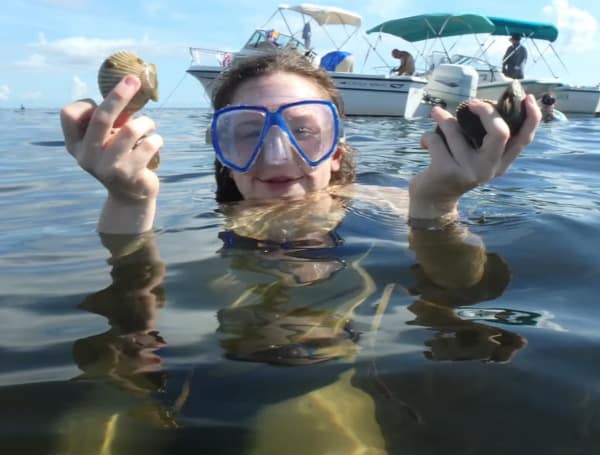
The 2023 recreational bay scallop season in the Fenholloway River through the Suwannee River Zone opens June 15 and will remain open through Labor Day (Sept. 4).
This includes all state waters in Dixie County, a portion of Taylor County, the towns of Keaton Beach and Steinhatchee and a small portion of Levy County.
The daily bag limit from June 15-30 in this area is 1 gallon of whole bay scallops in the shell or 1 cup shucked bay scallop meat per person, with a maximum of 5 gallons whole or 2 pints (4 cups) shucked bay scallop meat per vessel.
In the news: Reel In Some Florida Fun On License-Free Fishing Weekends In June
From July 1 through Labor Day in this area, and for the duration of the open season in other areas, regular bag and vessel limits apply. Regular season limits are 2 gallons of whole bay scallops in the shell or 1 pint of bay scallop meat per person, with a maximum of 10 gallons of whole bay scallops in the shell or 1/2 gallon (4 pints) shucked bay scallop meat per vessel.
Throughout the season and region-wide, vessel limits do not allow an individual to exceed their personal bag limit.
Other 2023 season dates
There are different regional bay scallop seasons, but the regulations do allow direct and continuous transit of legally harvested bay scallops through closed areas. When transiting, boaters may not stop their vessels in waters that are closed to harvest and must proceed directly to the dock or ramp to land scallops in a closed area. The other bay scallop season dates are as follows:
St. Joseph Bay/Gulf County: Aug. 16 through Sept. 24. This region includes all state waters from the Mexico Beach Canal in Bay County to the westernmost point of St. Vincent Island in Franklin County.
Franklin County through northwestern Taylor County: July 1 through Sept. 24. This region includes all state waters from the westernmost point of St. Vincent Island in Franklin County to the mouth of the Fenholloway River in Taylor County, Carrabelle, Lanark and St. Marks.
Levy, Citrus and Hernando counties: July 1 through Sept. 24. This region includes all state waters from the mouth of the Suwannee River in Levy County to the Hernando-Pasco county line, Cedar Key, Crystal River and Homosassa.
In the news: FWC Seeks Public Comment On Proposed Springs Protection Zone For Weeki Wachee Spring
Pasco County: Open July 1 through Aug. 6. This region includes all state waters south of the Hernando-Pasco county line and north of the Anclote Key Lighthouse, including all waters of the Anclote River.
Other regulations
Scallops may be collected by hand or with a landing or dip net.
There is no commercial harvest allowed for bay scallops in Florida.
For information on bay scallop regulations, visit MyFWC.com/Marine and click on “Recreational Regulations” and “Bay Scallops” under the “Crabs, Lobster and other Shellfish” tab
Boater and scalloper safety
Be safe when diving for scallops. Wear a life jacket when underway and do not drink and boat. When scalloping in open water, divers should stay within 300 feet of a properly displayed divers-down flag or device, and within 100 feet of a properly displayed divers-down flag or device if on a river, inlet or navigation channel. Boat operators traveling within 300 feet of a divers-down flag or device in open water or within 100 feet of one on a river, inlet or navigational channel must slow to idle speed.
Stow it, don’t throw it
Please do not discard scallop shells in inshore waters commonly used for recreational activities, such as near boat ramps or swimming areas. Piles of discarded scallop shells can create hazards for swimmers and damage seagrass habitat.
Scallop shells can be discarded in a trash receptacle or in larger bodies of water where they are more likely to disperse. Also, don’t forget to stow your trash securely on your vessel so that it doesn’t blow overboard.
Android Users, Click To Download The Free Press App And Never Miss A Story. Follow Us On Facebook and Twitter. Signup for our free newsletter.
We can’t do this without your help; visit our GiveSendGo page and donate any dollar amount; every penny helps.

